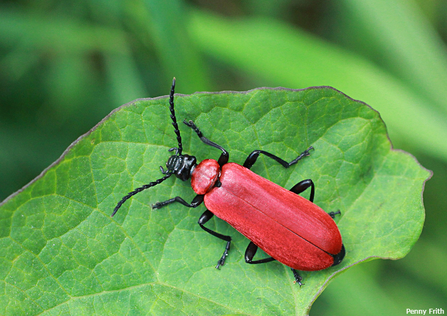
Cardinal beetle. Image by: Penny Frith.

Cardinal beetle. Image by: Penny Frith.
Early June is considered by some insect specialists to be ‘peak beetle’ season across the UK, when many species are out in force looking for a mate. Stag beetles are a classic example, with males locking their jaws and wrestling each other over mating sites.
However, conservationists fear that the topsy turvy weather in the spring - including an exceptionally cold April followed by a deluge of rain in May - could have had a detrimental impact on beetle populations this year.
In response, the 2021 Wild About Gardens Bring Back Our Beetles campaign is calling on gardeners to support beetles by:
Alice McCourt, Conservation Officer at Northumberland Wildlife Trust says: “There is growing evidence that the cold spring has affected this year’s beetles. Ladybird numbers, in particular, seem very low, which is probably due to the cold weather in April wiping out their prey - especially aphids.
“Many insects will have been flooded-out or washed-off their food plants in May’s torrential rain. Wet weather also increases the chances of fungal infection which can be problematic for beetles, as well as caterpillars of butterflies and moths. Insects are hugely adaptable, so let’s hope populations can recover with the warmer weather this month.”
Helen Bostock, Senior Horticultural Advisor at the RHS, says: “At last the warmer weather has meant gardeners can get out into their gardens. Plants are growing at speed and wildlife is really starting to get active too. The wet May means you’re more likely to see ‘Maybugs’ or cockchafers in June instead this year!
Anyone who has been leaving a patch of grass to grow long can now expect to see weevils and beetles on flowering daisies and buttercups and, if they’re really lucky, a glow worm or two among the grass. There’s still time to stop mowing a section of lawn for the summer or benefit your local beetle population by making a beetle bank.”
Alice McCourt concludes: “The amount of rain we had in May will certainly have affected a variety of insects - including beetles. Because flower-visiting beetles don't generally feed on deep 'bee' flowers - where nectar is sheltered by the tubular flower structure - their favoured plants, such daisies and hogweed, are prone to being literally washed out by rain.
“By recording what’s found in your garden - and creating more diverse habitats - gardeners can play a central role in helping to understand how beetles and other insects are doing this year.”
Anybody can pledge their patch for beetles and download a Bring back our beetles guide at: www.wildaboutgardens.org.uk.
There are more than 4,000 beetle species across the UK, but many are really struggling due to habitat loss, the use of pesticides and fertilisers, and unpredictable weather caused by climate change.
People are being encouraged to look out for: